-
Welcome to the eG Forums, a service of the eGullet Society for Culinary Arts & Letters. The Society is a 501(c)3 not-for-profit organization dedicated to the advancement of the culinary arts. These advertising-free forums are provided free of charge through donations from Society members. Anyone may read the forums, but to post you must create a free account.
Making Limoncello
-
Similar Content
-
- 8 replies
- 2,182 views
-
- 187 replies
- 31,046 views
-
- 147 replies
- 24,661 views
-
- 229 replies
- 35,886 views
-
- 338 replies
- 69,270 views
-
-
Recently Browsing 0 members
- No registered users viewing this page.




Recommended Posts